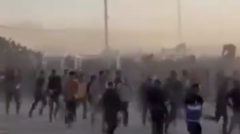The ongoing conflict between Israel and Hamas has raised grave concerns over compliance with international law, specifically the Geneva Conventions, leading to accusations of war crimes. The international community's response to Israel's actions could have lasting effects on diplomatic relationships and legal accountability for years to come.
The Legal Minefield: Israel's War Crimes Accusations and Global Repercussions

The Legal Minefield: Israel's War Crimes Accusations and Global Repercussions
As Israel faces accusations of war crimes during its latest conflict, the implications for international law and state accountability loom large over its leaders.
Article text:
The conflict ravaging Gaza and Israel has led to accusations of the gravest war crimes against Israeli forces. As each party engages in military actions, essential legal norms, which are designed to shield civilians from the horrors of combat, are supposedly upheld. However, the reality may be starkly different, with signs suggesting that violations of these laws are rampant on all sides.
On October 7, 2023, Hamas launched a surprise attack resulting in the deaths of approximately 1,200 Israelis, a tragedy that has stirred further violence and bloodshed. Across Gaza, the situation is dire, with reports indicating that Israeli military actions have killed thousands of civilians. The complexity of assessing and verifying the actual numbers within this warzone is extraordinarily challenging due to Israel’s resistance in allowing unfettered access to the territory for international media reports.
The International Committee of the Red Cross (ICRC) reinforces the idea that adherence to warfare regulations is non-negotiable; the Geneva Conventions exist to provide a legal structure that ensures humanitarian protections during conflicts. According to experts and diplomats, an ongoing concern is whether international supporters of Israel could face implications for being seen as complicit in potential war crimes if they do not act or condemn the violence occurring within Gaza.
The response from Israel’s government is often dismissive. Israeli Prime Minister Benjamin Netanyahu and his coalition face accusations of prolonging conflicts for political survival rather than true national security interests. Critics charge that Netanyahu, pivoting from his past legal troubles, is capitalizing on the crisis to deflect attention away from his actions pre-dating the recent escalation. Simultaneously, senior politicians with ties to him have dismissed international calls for accountability, asserting that Israel operates within the bounds of warfare regulations.
The toll of the conflict on civilians continues to grow—UNICEF estimates that a staggering number of Palestinian children have been casualties of the ongoing violence. However, access to reliable and independent information remains elusive, with risks inherent in attempting to report from the beleaguered territory.
As various nations vocalize their positions, a growing rift appears between staunch allies like the United States and European nations that have consistently supported Israel's right to defend itself but are increasingly uncomfortable with the methods of warfare being employed. Statements from governments of the UK, France, and Canada, which have called for cessation of hostilities and opening up humanitarian access, reflect the widening gap over Israel's military conduct.
The debate surrounding potential genocide claims raises further complexity. Legal analysts underscore the high bar for proving intent—an essential element in any genocide case. Calls from international legal entities for investigations into Israel’s actions may lay the groundwork for unprecedented judicial proceedings in relation to war crimes and political accountability.
What will ultimately unfold remains uncertain, but there is a palpable fear that the ramifications of this conflict will haunt leaders involved for years to come. Established norms surrounding the conduct of war hang in the balance, risking erosion where human dignity is overlooked. The conflict continues, and journalists and humanitarian workers remain cautiously persistent, striving to observe and report on the grim realities encapsulated within this ongoing crisis, yet facing persistent and dangerous obstruction.
As the international community grapples with these complex legal and moral dilemmas, the consequences of inaction or partiality could alter diplomatic relations and perceptions of justice in unprecedented ways. In wars where morals and laws seem to fray, the stakes are profoundly human—a cautionary tale echoing through history’s corridors.
The conflict ravaging Gaza and Israel has led to accusations of the gravest war crimes against Israeli forces. As each party engages in military actions, essential legal norms, which are designed to shield civilians from the horrors of combat, are supposedly upheld. However, the reality may be starkly different, with signs suggesting that violations of these laws are rampant on all sides.
On October 7, 2023, Hamas launched a surprise attack resulting in the deaths of approximately 1,200 Israelis, a tragedy that has stirred further violence and bloodshed. Across Gaza, the situation is dire, with reports indicating that Israeli military actions have killed thousands of civilians. The complexity of assessing and verifying the actual numbers within this warzone is extraordinarily challenging due to Israel’s resistance in allowing unfettered access to the territory for international media reports.
The International Committee of the Red Cross (ICRC) reinforces the idea that adherence to warfare regulations is non-negotiable; the Geneva Conventions exist to provide a legal structure that ensures humanitarian protections during conflicts. According to experts and diplomats, an ongoing concern is whether international supporters of Israel could face implications for being seen as complicit in potential war crimes if they do not act or condemn the violence occurring within Gaza.
The response from Israel’s government is often dismissive. Israeli Prime Minister Benjamin Netanyahu and his coalition face accusations of prolonging conflicts for political survival rather than true national security interests. Critics charge that Netanyahu, pivoting from his past legal troubles, is capitalizing on the crisis to deflect attention away from his actions pre-dating the recent escalation. Simultaneously, senior politicians with ties to him have dismissed international calls for accountability, asserting that Israel operates within the bounds of warfare regulations.
The toll of the conflict on civilians continues to grow—UNICEF estimates that a staggering number of Palestinian children have been casualties of the ongoing violence. However, access to reliable and independent information remains elusive, with risks inherent in attempting to report from the beleaguered territory.
As various nations vocalize their positions, a growing rift appears between staunch allies like the United States and European nations that have consistently supported Israel's right to defend itself but are increasingly uncomfortable with the methods of warfare being employed. Statements from governments of the UK, France, and Canada, which have called for cessation of hostilities and opening up humanitarian access, reflect the widening gap over Israel's military conduct.
The debate surrounding potential genocide claims raises further complexity. Legal analysts underscore the high bar for proving intent—an essential element in any genocide case. Calls from international legal entities for investigations into Israel’s actions may lay the groundwork for unprecedented judicial proceedings in relation to war crimes and political accountability.
What will ultimately unfold remains uncertain, but there is a palpable fear that the ramifications of this conflict will haunt leaders involved for years to come. Established norms surrounding the conduct of war hang in the balance, risking erosion where human dignity is overlooked. The conflict continues, and journalists and humanitarian workers remain cautiously persistent, striving to observe and report on the grim realities encapsulated within this ongoing crisis, yet facing persistent and dangerous obstruction.
As the international community grapples with these complex legal and moral dilemmas, the consequences of inaction or partiality could alter diplomatic relations and perceptions of justice in unprecedented ways. In wars where morals and laws seem to fray, the stakes are profoundly human—a cautionary tale echoing through history’s corridors.



















